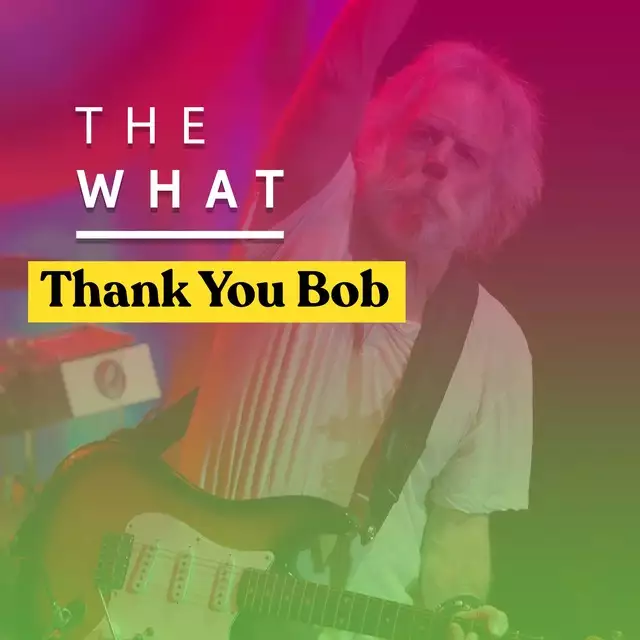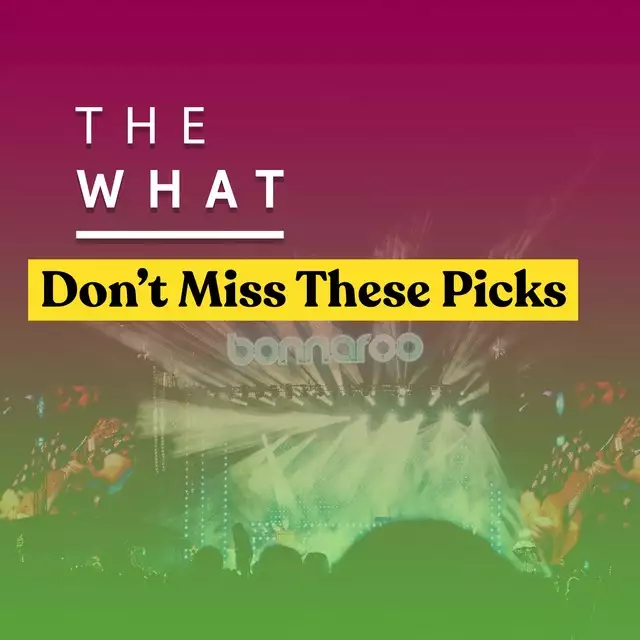
This week's The What Podcast is a special bonus episode revisiting an interview with the co-founder of Bonnaroo himself, Ashley Capps.
In this High Five Clip, Brad and Barry share two short clips from their 2018 interview with Capps. The three discuss the festival's impact on live music and of course, the Paul McCartney show in 2013. You can also revisit the complete interview here.
Don't forget to like, review, and subscribe to The What Podcast wherever you get your podcasts.
Hey everybody.
Welcome back to the What Podcast.
I'm Barry Courter.
You will notice that missing this week are Brad and Lord Taco.
Brad is of course busy out running around who knows where with his new best friend Bill
Murray and Lord Taco is I'm sure somewhere probably on his bus on Twitch saving yet another
blue haired princess.
This is sort of the in between time or the downtime or the quiet time whatever you want
to call it in the festival season.
There are fall festivals going on of course but most of the big ones are over for 2022
and they will gear back up sometime in December, January, February when they announce lineups
and we will be there for that.
But until then we thought it might be fun to go back and maybe put together some short
shows much shorter shows from clips of our earlier shows.
We've been doing this now since 2018 if you can believe it.
Today for example I've got two clips from Ashley Capps.
He's the AC Entertainment and he's the co-founder of the Bonnaroo Music and Arts Festival.
He joined Brad and I back like I said in 2018.
This first clip he discusses the importance what we think is the importance of Bonnaroo
when it came on to online in 2022 and then he talks about everybody's number one artist
ever at the Bonnaroo Festival.
It's really Paul McCartney number one and then everybody else number two.
It was such an incredible experience for everybody that was there including you know Ashley who
like Brad and I but on a larger scale maybe does this for a living.
It was an important show for him as well.
So we hope to do a few of these many what podcasts like I said in the between time as
we get ready for lineup announcement coming up in the beginning of season six.
Incredible to think about.
We hope you'll go hit that subscribe button.
We hope you'll share.
We hope you will tell your friends and we hope even more importantly to see you on the
farm next summer.
Thanks again for listening.
Here's Ashley Caps.
So let's get to it Ashley Caps the subject of today's the what podcast.
First of all thank you but I want to take you back a couple of years to actually forecast
I don't know if you remember but I introduced you to Brad in the bourbon tent.
Oh I'm sure this I'm sure this is going to go well.
And first of all.
And you expect me to remember that.
No but I'm going to ask Brad what you just said.
I'm going to ask Brad if he remembers what he said to you and then I'm going to say your
reaction was to look at me like do we need to call security which is which is a perfectly
legit I have no earthly clue.
OK well it's important it's relevant.
You you said to him you know hello and then you thanked him.
You thanked Ashley for saving music.
I actually believe in this.
Yes.
I actually I've had this argument with people before.
I think that that Bonnaroo and in the festival culture saved not only live music but it transformed
the entire industry.
Wow.
Yeah.
That's quite a thought.
It's it's a little over the top but but I don't just for a living.
I don't disagree with him because I remember and this is where I wanted to start with you
actually is I remember thinking after about the second one that this is why I got into
writing about music in the first place.
It was a it re-energized me and I think that was Brad's point.
Do you hear that ever from anywhere else Ashley and what are your thoughts on that.
I think I hear that in you know expressed in different ways and I've never thought of
it in quite those terms but I think in some ways it's true for me as well because in those
days I think we were you know I you know as a promoter as a concert promoter and as a
music fan I think it was a moment where we were kind of looking for a way forward you
know and and trying to break the mold of the standard concert presentation that was going
on and looking for new ways to engage people socially and also to excite people I think
by by presenting the music in a really exciting way and in a context that connected it to
a greater whole and so I think all of those things were we would never have stated it
that way at the time.
You know this is kind of something you think about in retrospect.
You know I think it's an interesting thought because it did transform people's experience
of music in certain ways at least here in the United States.
Obviously that that culture had been alive and well in Europe for decades.
One of the reasons we wanted to talk to you a couple reasons obviously you're in what
your actual job you also are a fan.
I see you there every day and your you know your chakras and your your list your program
whatever and you're heading out to see a show.
Well apparently not if there's a bourbon tent.
Well that was Forecastle.
He was on his way but what I wanted to ask you about.
I thought the bourbon tent at Forecastle was one of the headliner.
Yeah it is honestly.
It's awesome.
What there's a couple of things that the I saw you last year at Angelique Key Joe probably
I don't know a couple hundred people but the McCartney thing you and I spoke the next day
for quite a while and that was such a moment for so many people but I remember hearing
from you that that was as a fan just like for me that was a huge moment.
Those types of things that can happen at Bonnaroo the big and the small.
Absolutely you know to me scale is not necessarily a factor it's that ability of an artist to
connect with you as a member of the audience.
You know Angelique Key Joe is an amazing performer and that was you know I had been hoping to
present her at Bonnaroo for years so it was wonderful to be able to finally do it and
that was such a great show.
At the same time even though he was in front of a huge audience Paul McCartney had this
just extraordinary gift to make you feel like he was just playing for you and your friends.
I mean there was such a you know in spite of the scale of the whole experience it was
very intimate you know in a way that it kind of sounds crazy.
Get the latest episodes of The What Podcast delivered straight to your favorite app. Subscribe now!



